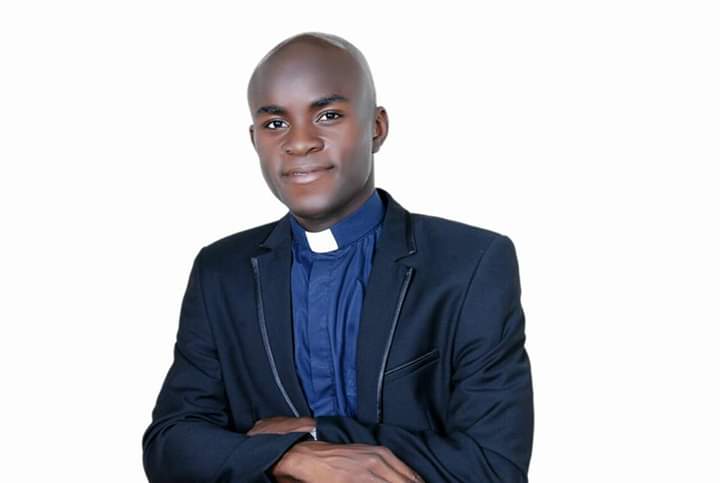Homilies & Reflections
Solemnity of All Saints by Fr. Lucas Binnah
First Reading: Revelations 7:2-4.9-14/Responsorial Psalm: Psalm 24:1-2.3-4ab.5-6 (R. cf. 6a) Second Reading: I John 3:1-3/Gospel Acclamation: Matthew 11:28/Gospel: Matthew 5:1-12
Theme: Called to be Holy
Young people want to be like their friends, and sometimes they copy blindly. In the adolescent stage of life, peer pressure is a common feature. Contemporaries or age-mates influence one another, and this can be both positive and negative. Leaders are also able to lead through influence. They do so through powerful speeches, actions and gestures which spur others to follow a particular path. One positive and powerful influence is leading by example. We all are influenced one way or the other by one thing or another. It could be that person or the other; that saint or role model; that celebrity or academic genius; that inventor or discoverer; that incident or the other; that environment or the other, and that situation or the other.
The Catholic liturgical calendar is dotted with many memorials, feasts and solemnities of various saints some of whom received the martyr’s crown. Yet, there are countless numbers of others whose saintly lives no calendar can have enough space to contain. Today, we celebrate the Solemnity of All Saints, the Church Triumphant, to remember these people, and how they allowed the grace of God to triumph over their human sinfulness and weakness. Indeed, having responded to the call of God to live in holiness, they now live with God in heaven and also make intercessions for us on earth. We, the Church Militant, are encouraged to imitate their footsteps.
God speaks through Moses: “Be holy, for I, Yahweh your God, am holy” (Lev. 19:2, I Pet. 1:15). God expects his children to share in his holiness, and the call to holiness is universal. He chose us in Christ before the world was made to be holy and faultless before him in love (cf. Eph. 1:4). Therefore, our first vocation is holiness. In the first reading, we hear of “a great multitude which no man could number, from every nation, from all tribes and peoples and tongues, standing before the throne and before the Lamb, clothed in white robes, with palm branches in their hands, and crying out with a loud voice, ‘Salvation belongs to our God who sits upon the throne, and to the Lamb!”(Rev.7:9-11). Being clothed in white and holding palm branches is a metaphor for victory over sin and evil. They endured temptations and suffered persecutions, witnessed to Christ and the Gospel, and embraced a life of virtue to the extent that some even lost their lives. Little wonder, that of them is said: “These are they who have come out of the great tribulation; they have washed their robes and made them white in the blood of the Lamb” (Rev. 7:14). They simply lived for the sake of Christ and some were young, even children; others were lay faithful, although they included the clergy and religious too!
How were the saints made saints if they did not pursue virtue even in the midst of a sinful world? They are the ones considered “…the clean of hands and pure of heart, whose soul is not set on vain things” (Ps. 24:4). According to the Psalmist, “Such are the people who seek your face, O Lord” (Ps. 24:6). If we want to be numbered among the Saints then we have to imitate their examples. In little ways they have kept faith in Christ and lived authentically even to the point of death. Their lives have influenced others and our own must do the same. We can and must be influential if we are to be faithful and effective witnesses of Christ. Like a magnet, we must be attractive not for the wrong purposes, but for the ultimate aim of winning people for Christ. It begins with living a life that is worthy of God in our everyday and ordinary contexts. Then, our words and actions must correlate, making us people of integrity and trust. To this end, St. Teresa of Calcutta (Mother Teresa) teaches: “Holiness does not consist in doing extraordinary things. It consists in accepting, with a smile, what Jesus sends us. It consists in accepting and following the will of God.” She adds, “Holiness is for every one of us as a simple duty – the acceptance of God with a smile, at all times, anywhere and everywhere.”
Furthermore, the second reading admonishes us as children of God, to purify ourselves in imitation of God who is pure if we hope to share eternal life with him (cf. I Jn. 3:3). In fact, we learn that it is only those who live in purity who shall see the face of God (cf. Mt. 5:8). In addition, Jesus teaches us in the Gospel to embrace a life of blessedness, where the beatitudes become the Christian’s charter, their rule of life. We are to depend on God in all things in true love, humility and trust. This is what entails being poor in spirit. In an era in which the world thinks holiness and righteousness are impossibilities, Jesus challenges us to actually yearn for them (cf. Mt. 5:6, 10). Again, we need to consider our fellow human beings by being merciful and compassionate, empathetic and sympathetic, and peace-loving. Also, in the face of wanton violence against Christians and Christianity, we are called to remain joyful and glad as our reward is great in heaven (cf. Mt. 5:11-12). Our minds quickly go to the killing, beheading and torture of Christians for standing by their faith and for the truth. We have not forgotten the recent conversion of Hagia Sophia, into a mosque. We are not oblivious of the legal, constitutional and institutional lobbying by certain politicians, professionals and associations to undo, better still, uproot the Christian culture which undergirds and sustains many countries in the world.
On a daily basis, we need to ask ourselves these questions: What is it that influences us? What are our motivations? What urges or spurs us on? What gives us the energy that drives our lives? Of all these, the multi-billion-dollar query is: Do we allow God to influence us or not? Put in other words, do the things of God, those who follow Jesus so closely, the holy men and women of God, the lives of the saints, influence us in any way? Does the life and ministry of Jesus influence us? If yes, why is that people find it difficult to experience Jesus Christ in our lives and world? Why then do people, even Christians publicly reject the commandments of God and by their speeches and actions, support everything that is anti-life? Indeed, if we have the hold of Christ on us, then, people must see Christ in us in very concrete and tangible ways. Beloved in Christ, let us pray and draw inspiration from the lives of the saints and imitate their heroic and virtuous lives in spite of global challenges. By doing so, we will come to share in the heavenly inheritance which the saints now enjoy. May the saints intercede for us now and always. Happy Sunday and may God bless us! Remember: #We-Are-Called-To-Be-Holy#
By Rev. Fr. Lucas Binnah Junior, C.S.Sp.
Sharing is caring!
Ghana Catholic News aim to provide up to date news on the Catholic Church in Ghana on various disciplines such as diocese, priesthood, programs/events, promoting of the Catholic faith, daily readings, homilies, Catechism, etc.





